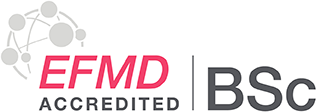Research
The Business School Pforzheim sees applied research as a main strategic goal firmly anchored in its mission. Pforzheim University, with its close ties to industry and practice, is an ideal place for applied research that draws on the results of basic re- search to develop new solutions with a high level of practical relevance. The Business School focuses particularly on the self-determined research commitment of the faculty members. Students also have the opportunity to share research results from course projects and seminars, bachelor's, and master's theses through conferences and publications under the guidance of their instructors.
The comparative strengths lie in a combination of academic qualification, practical experience of the professors as well as a in the multifaceted nature of the different methods when conducting research projects. The PDF brochure Competence Navigator illustrates the wide range of research fields and perspectives of Business School. Research findings are published as scientific articles, legal commentaries, scholarly papers and textbooks in the areas of applied scholarship, basic or discovery scholarship, and teaching and learning. Publications are predominantly application-oriented contributions to practice, followed by papers on basic disciplinary research and textbooks supporting teaching.
Bundled expertise: research institutes and competence centers
As a relevant part of research, externally funded research is of great importance. It not only provides access to additional resources, but also creates new national and international research networks. Third-party funded projects are usually acquired and carried out through the university-wide Institute for Applied Research (IAF) or through institutes and competence centres specialized in specific disciplines.
Institute for Applied Research (IAF)
The Institute for Applied Research is the institutional governing body for research facilities of all three faculties at Pforzheim University and forms the starting point for research activities. It forms an organizational unit for the coordination and optimization of existing research and development (R&D) activities. The IAF provides the infrastructure and a supportive environment for the implementation of research and development projects. It is the point of contact for companies and partners interested in joint research projects.
Institute for Industrial Ecology (INEC)
The Institute for Industrial Ecology serves as a nexus for research activities undertaken by the faculty on sustainability, particularly with regard to economics and the environment. The INEC is one of the largest and most well-established research clusters at Pforzheim University. It is also a well-recognized member of the German research community. The INEC encourages the growth of interdisciplinary ties between various disciplines. Currently, nine professors — all of them known for their research productivity — are members of the INEC. They represent a range of disciplines, from economics to engineering and the natural sciences. The Institute is known for the expertise with which it carries out research projects, as well as for the advising services it provides to professionals in the worlds of business and politics.
In addition to conducting life cycle assessments and similar methods of ana- lysis, the Institute investigates questions related to resource efficiency in firms and production systems. In this regard, researchers seek to illuminate manage-ment issues and associated problems, such as those that arise in so-called lean production. Issues related to consumer behavior have also been investigated in recent projects.
Institute for Human Resources Research (IfP)
The Institute for Human Resources Research deals with both application-oriented research and scientific accompanying research in practice. The content of the institute’s research work focuses on current HRM issues that have a clear practical focus. These questions are to be empirically investigated on the basis of a well-founded organizational theoretical foundation. The research focuses on sustainability in companies, agility in organizations and innovation in HR. The research focuses on the question of what role HR management is taking on or will take on today and in the future. In addition, the institute also deals with individual topics of HRM, such as personnel manage- ment in Industry 4.0, Generation Y, benefit management, recruiting or co-determination and industrial relations.
Institute for Consumer Research and Sustainable Consumption (vunk)
The Institute for Consumer Research and Sustainable Consumption pools Pforzheim University's interdisciplinary research activities on issues relating to the society of the future. It offers a platform for applied research in the field of consumer, user and sustainability research. It facilitates transfer as well as exchange and cooperation with and also in relation to government agencies, civil society, business, media and politics. The work of vunk refers to the research, co-design and accompaniment of a society of the future, its technology, economy and legal framework. This is done with the aim of balancing the diverse interests. The yardstick for this balance of interests is formed by basic values on whose validity a society of the future can agree across the board, e.g. fundamental rights.
Doing a PhD at the Business School Pforzheim

Only universities or equivalent institutions of higher education have the right to award doctorates in Germany so far. Academic members of staff at Pforzheim University who are active in a Bachelor's or Master's program, or are directly assigned to the faculty, have the opportunity to obtain a doctorate while working at the business school. Provided that they are academically qualified, the doctoral thesis can be written while working at the university in the form of a cooperation between the Business School Pforzheim and a full university entitled to award a doctorate degree.
As a rule, a doctorate requires an above average Master's or Magister degree from a full university or a university of applied sciences. Which additional requirements apply is regulated by the particular doctoral regulations of the university where the doctorate is pursued.
Options for a doctorate
For an individual doctorate, doctoral students choose their own topic and look for suitable supervisors at Pforzheim University, as well as at a full university. The supervisor at Business School Pforzheim may be able to assist in the search for a primary thesis supervisor. The dissertation can be written while working as an academic assistant at Pforzheim University or full-time, financed by a doctoral scholarship. Scholarships in Germany are mainly provided by the "Begabtenförderwerke", foundations and state graduate scholarships. When working as a research assistant in a research project, the PhD process can be part of a larger third-party funded project. The PhD students are employed as academic researchers for the duration of the project, are financed by the project funds and contribute with their research to the overall research program.
Employees at the Business School Pforzheim have different options depending on their research question, subject area or department: Some of the Business School's professors who are particularly committed to academic research are members of the Baden-Württemberg Doctoral Association. Through this membership, they have the right to award PhDs and may act as first supervisor in doctoral procedures within the framework of the academic association. Individual professors of the Business School Pforzheim, who are typically habilitated, also have the right to award PhDs through their association with a university – i.e. co-opted membership of a university department – and can thus also supervise doctorates at the university at which they are associated.
A second option is to enter a cooperative dissertation supervised by a second supervisor at the Business School Pforzheim and a first supervisor from a full university, entitled to award a PhD degree. These partners are cooperating domestic or foreign universities. PhD co-operations within Germany are typically based on the personal contacts of a professor from Pforzheim or are established by the doctoral candidate by individually approaching university professors. Institutional co-operations with foreign partners such as the triple-crown accredited University of Ljubljana are based on structured doctoral programs.
The third option is to obtain a PhD in a structured doctoral program. At Pforzheim University, "ENRES – Energy Systems and Resource Efficiency" is a program designed for PhD students who wish to do a doctorate in the field of energy and resource efficiency. It is run in cooperation with the Karlsruhe Institute of Technology (KIT) and the University of Applied Sciences Stuttgart. Doctoral students receive a scholarship and are supervised by experienced professors at Pforzheim University and the participating university. Students work together with the other scholarship holders in the research training group. The program is currently not accepting new doctoral students.


